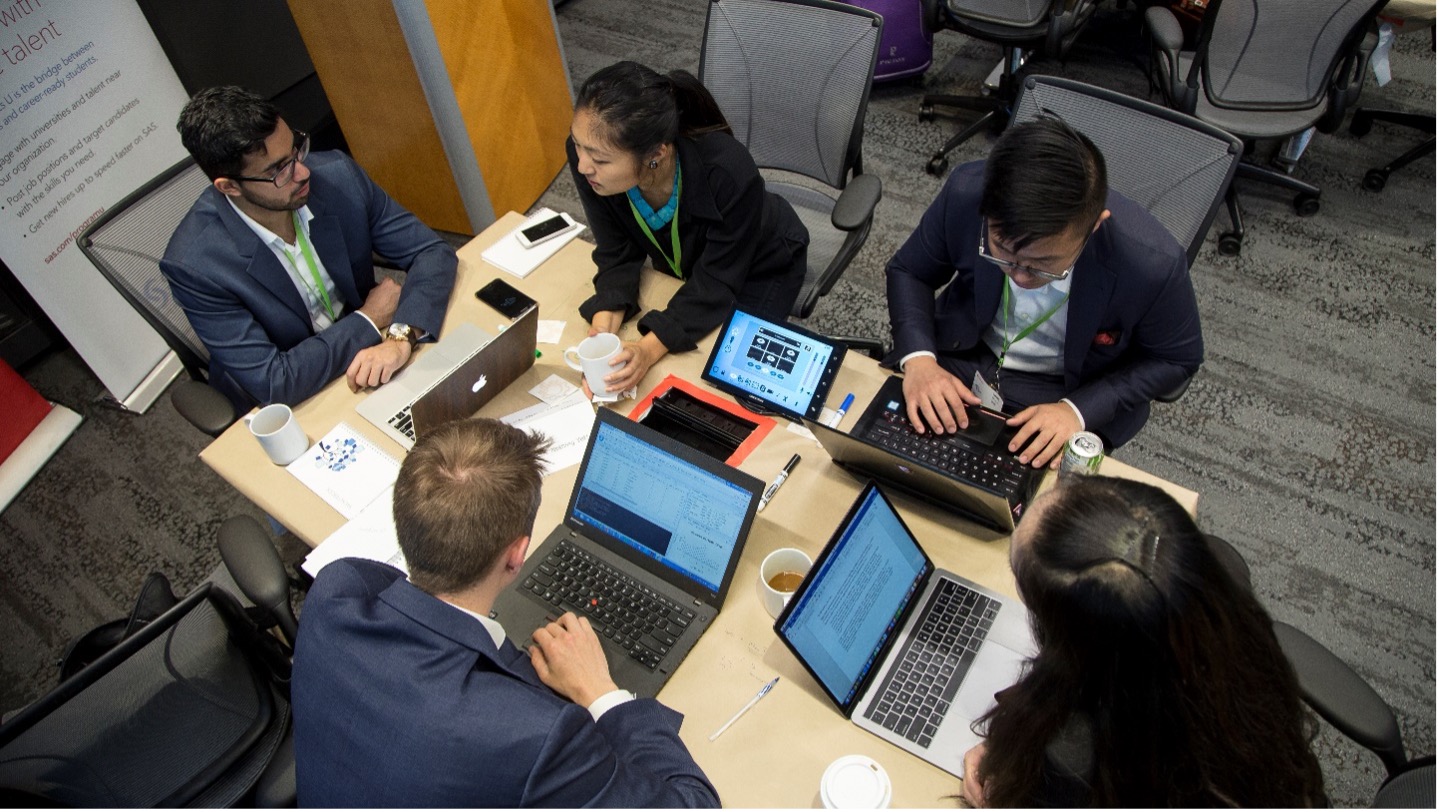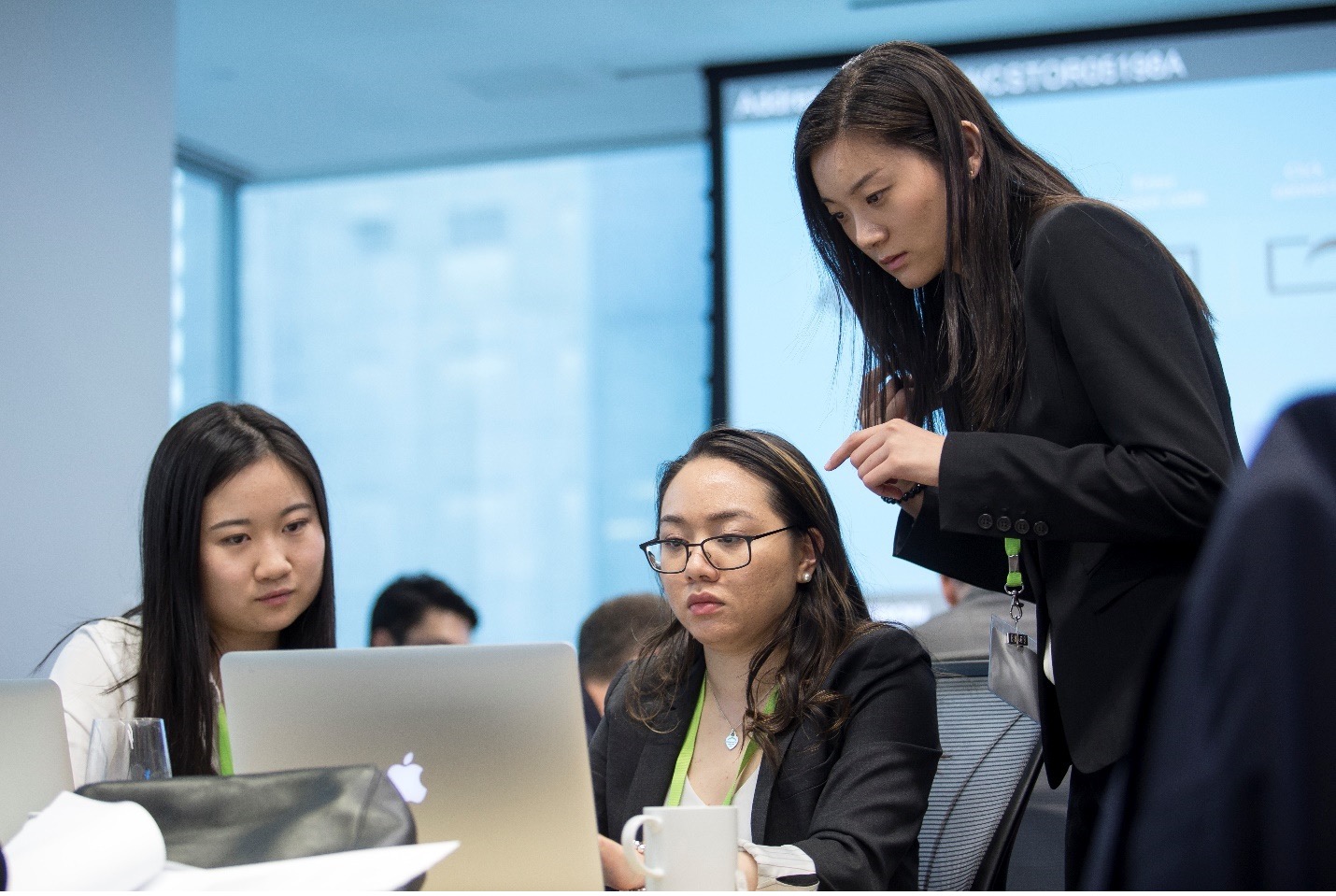"Exhausting, but exhilarating," said participants in Hack the Case – a unique, 10-day competition hosted by Ivey Business School, SAS, Deloitte and Scotiabank, with the assistance of the Centre for Advanced Computing, Queen’s University.
Students from Ivey Business School’s Master of Science (MSc) in Management, Business Analytics start with a rigorous three-day SAS software training workshop and then they're given a business case to dive into for the following seven days.
“It’s a really interesting experience where students partner with classmates to solve a challenge for a client,” says Afshin Nensi, who participated in Hack the Case as an Ivey student in 2019.
By the end of the competition, students have put in long days (and some long nights), digging through big data sets and analyzing real-world business problems under an extremely tight deadline – giving them a true glimpse into the fast-paced world of business analytics.
“We have three days to learn the SAS program, and then get thrown into an ocean of data with a team of classmates to apply what we've learned. For most of us, it’s our first opportunity to interact with a real client using real data."
- Afshin Nensi, 2019 "Hack the Case" participant
Training the next wave of business analysts
Since holding its first Hack the Case competition in 2017, the project has become a pillar of the MSc Business Analytics program at Ivey. SAS, Deloitte and Ivey developed the competition not just to train, but also to recruit new business analysts.
For Nensi, participating in Hack the Case allowed him to get in front of Deloitte executives, who then offered him a full-time position upon graduation. Today, Nensi works as a senior consultant for Deloitte Omnia AI.
“While in graduate school, I was interested in pursuing a career in health care analytics and improving patient outcomes through data analytics and AI. I had always associated Deloitte with financial institutions, but in networking with team members during Hack the Case, I learned they also have a big presence in health care and life sciences,” Nensi says. “So participating in Hack the Case played a big part in leading me to my current role.”
Challenging students to work with real data
During the competition, students have the opportunity to work with real data compiled by the project’s “client,” Scotiabank. Zenzie Rees, Scotiabank’s Director of Portfolio Management for their Customer Loyalty & Partnerships division, thought it was a great opportunity for the company to further its data-driven strategy.
“Scotiabank had an already-prepared data set stored with the Centre for Advanced Computing for their Scene database – which is a loyalty program they offer to movie-goers,” says Greg Zaric, Ivey’s MSc Analytics Program Director.

The challenge for students is to use the data from the Scene database to find ways to keep Scene members loyal to Scotiabank. From the initial release of the data set, students have a week to work in teams of five to six students (with help from professional mentors) to develop a presentation to deliver to a panel of professionals from SAS, Deloitte and Scotiabank. Mentors are often former Ivey MSc students who are now Deloitte employees and can relate to the challenges firsthand -- which makes the connections especially valuable.
“I served as a mentor for two years. It helps because we can relate to the students since most of us went through Hack the Case ourselves. We remember the pressure and tight timeline,” Nensi says. “We try to help steer them in the right direction. And it’s nice getting to know the students outside of a regular networking call or coffee chat.”
Rees from Scotiabank, who served on the judging panel, agrees. “This was my first experience being a Hack the Case judge. Needless to say, it was a great first impression and I'm interested in participating in these in the future,” Rees says. “Speaking on behalf of the Loyalty & Partnerships team, we're actively working with Ivey to see how we can offer a winning student an opportunity to intern at Scotia. We know there's great talent out there.”
Ivey's MSc Business Analytics program and the Hack the Case project have grown together, Zaric says. “Our first cohort of 21 students started in January 2016, and they worked on the first Hack the Case competition in April 2017. Now we have more than 70 students per cohort,” Zaric says. “We hold the competition at the very end of the term after exams and projects wrap up. It’s a great opportunity for students to apply what they’ve learned in class. In the past, they’ve been able to present their final projects in front of a panel in Deloitte’s Toronto office, which is a fantastic experience for them.”
Zaric says many students say that Hack the Case is even more intense than their exams – but after they make it through, they often point to it as the highlight of the program.
“The finalists and winners of Hack the Case often rush to post about their performance on LinkedIn within hours of presenting,” Zaric says. “You can tell they appreciate the experience.”

Creating a talent pipeline for companies
When Deloitte - a longtime SAS client - was looking for new ways to recruit and train data analysts, SAS and Deloitte came up with the idea for Hack the Case.
“We regularly hear from clients like Deloitte that they're eager to find students who are comfortable with using SAS software,” says Mark Morreale, Senior Global Academic Program Manager from SAS Academic Program in Canada. “Hack the Case is a great way for us to give graduate students real-world experience and training using our software, while also helping our clients fill the talent pipeline that's so critical to their ongoing success.”
Thankfully, the program has done just that. Graduates of the program often have Deloitte and Scotiabank high on their list of prospective employers, according to Zaric.
“It’s a rare opportunity for students to demonstrate how they think and work in front of their potential employer,” Nensi says. “Currently, our most recent Ivey MSc graduates at Deloitte have the opportunity to go back and serve as the next Hack the Case mentors. It’s a great full-circle experience, so we want to make sure we continue to share the opportunity for leadership with our younger colleagues.”
Rees sees unique value in these academic-industry partnerships. She believes they allow sectors to bring different perspectives of needs and wants within their area of expertise to achieve the “big picture.”
“A collaboration of the two provides an opportunity to go one level down in understanding the steps it will take to be successful in attaining or reaching that vision,” she says. “A bonus part of the engagement is listening to both the partners and students share their perspectives on the loyalty program, as these recommendations contribute to our ideation and strategy process.”

